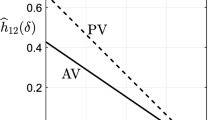Abstract
This article compares Plurality Voting (PV) and two forms of Runoff Elections (RE) in a setting in which (i) there are two majority-preferred alternatives, (ii) a strong minority backs a third alternative which would make the majority strictly worse off, and (iii) some of the majority voters are uninformed about the “correct" majority alternative. I show that in Majority Runoff Elections (MRE), there exists an informative equilibrium in which uninformed majority voters vote randomly with strictly positive probability, achieving partial information revelation. Meanwhile, uninformed majority voters always abstain in the unique informative equilibrium in Automatic Runoff Elections (ARE), achieving full information revelation and strictly improving the majority’s welfare. However, uninformed majority voters never abstain in PV, resulting in less information revelation than in both MRE and ARE.
Similar content being viewed by others
Data Availability Statement
Not applicable.
Code Availability
Not applicable.
Notes
Bouton et al. (2016) use a similar environment to study Approval Voting.
References
Battaglini, M., Morton, R. B., & Palfrey, T. R. (2010). The swing voter’s curse in the laboratory. Review of Economic Studies, 77(1), 61–89.
Bouton, L., Castanheira, M., & Llorente-Saguer, A. (2016). Divided majority and information aggregation: Theory and experiment. Journal of Public Economics, 134, 114–128.
Cox, G. W. (1997). Making votes count: strategic coordination in the world’s electoral systems. Cambridge University Press.
Duverger, M. (1954). Political Parties. Wiley.
Feddersen, T. J., & Pesendorfer, W. (1996). The Swing voter’s curse. American Economic Review, 408–424.
Feddersen, T. J., & Pesendorfer, W. (1999). Abstention in elections with asymmetric information and diverse preferences. American Political Science Review, 93(02), 381–398.
Martinelli, C. (2002). Simple plurality versus plurality runoff with privately informed voters. Social Choice and Welfare, 19(4), 901–919.
Moore, E., Mccrum, D., & Fortado, L. (2017). French bond trading soars as fear of populist wave drives investors. Financial Times, 16 Feb, p. 1.
Piketty, T. (2000). Voting as communicating. Review of Economic Studies, 67(1), 169–191.
Riker, W. H. (1982). The two-party system and Duverger’s law: An essay on the history of political science. American Political Science Review, 76(4), 753–766.
Tsakas, N., & Xefteris, D. (2020). Information aggregation with runoff voting. SSRN Working Paper.
Acknowledgements
I thank Mark Fey for valuable comments on the paper.
Funding
Not applicable.
Author information
Authors and Affiliations
Corresponding author
Ethics declarations
Conflict of interest
Not applicable.
Additional information
Publisher's Note
Springer Nature remains neutral with regard to jurisdictional claims in published maps and institutional affiliations.
Rights and permissions
Springer Nature or its licensor holds exclusive rights to this article under a publishing agreement with the author(s) or other rightsholder(s); author self-archiving of the accepted manuscript version of this article is solely governed by the terms of such publishing agreement and applicable law.
About this article
Cite this article
Gao, J. On Plurality Voting and Runoff Elections: Information Revelation Under Divided Majority. Homo Oecon (2022). https://doi.org/10.1007/s41412-022-00136-5
Received:
Accepted:
Published:
DOI: https://doi.org/10.1007/s41412-022-00136-5




